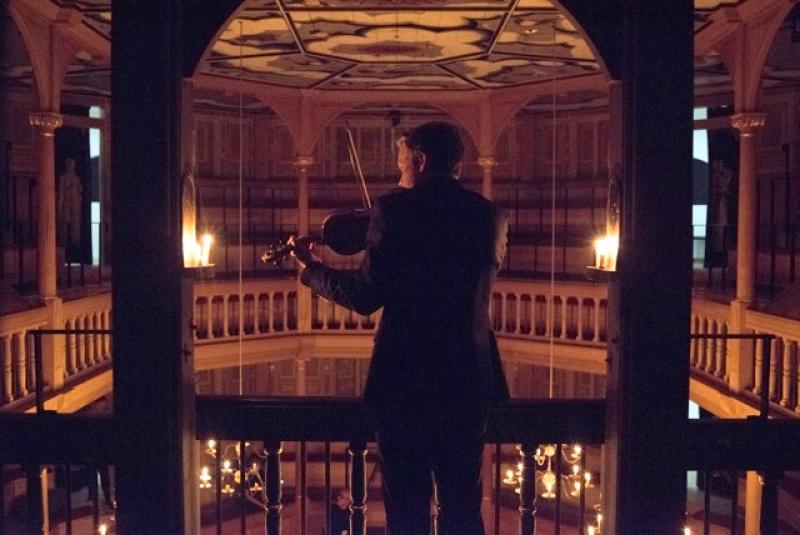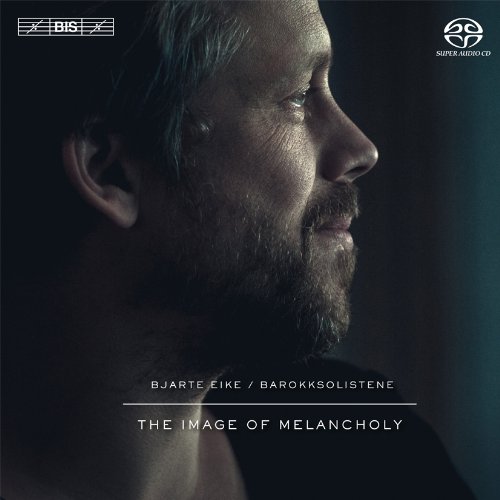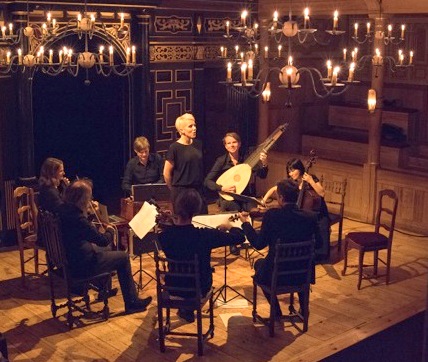The Image of Melancholy, Eike, Sam Wanamaker Playhouse | reviews, news & interviews
The Image of Melancholy, Eike, Sam Wanamaker Playhouse
The Image of Melancholy, Eike, Sam Wanamaker Playhouse
Meditation, measured dance and catharsis from Barokksolistene

“Sounds a bit depressing,” said several friends when I urged them to attend the theatrical incarnation of The Image of Melancholy, inspirational violinist Bjarte Eike’s award-winning CD with his stunning Norwegian-based group Barokksolistene. Creative melancholy, though, is not the same as stuck depression, and the sequence on the disc was well-balanced with songs and dances as well as superbly engineered sound.
 It was admirable of Eike to vary the strain and not repeat the CD sequence in its entirety, but the contrasts were fewer: about 15 shades of black with only a couple of galliards and the marginally less delicious of the two wedding marches on the CD – the Norwegian rather than the Swedish, which I prefer – to set the feet tapping. Otherwise the body and soul certainly swayed. The string sound can be so deep and rich, with Eike’s reflective ornamentions echoed and underpinned by Milos Valent and Per Buhre, and Fredrik Bock is an original and personal arche-lutenist, with some wonderful guitar-like strummings to punctuate the introspection.
It was admirable of Eike to vary the strain and not repeat the CD sequence in its entirety, but the contrasts were fewer: about 15 shades of black with only a couple of galliards and the marginally less delicious of the two wedding marches on the CD – the Norwegian rather than the Swedish, which I prefer – to set the feet tapping. Otherwise the body and soul certainly swayed. The string sound can be so deep and rich, with Eike’s reflective ornamentions echoed and underpinned by Milos Valent and Per Buhre, and Fredrik Bock is an original and personal arche-lutenist, with some wonderful guitar-like strummings to punctuate the introspection.
I didn’t realize until the end that Jon Balke was up in the gallery manipulating the soundscapes; the lugubrious mood was appropriate, but occasional twangs and shuffles sounded more like mobile phones and audience fidgets (which in fact were minimal; the background, as it had been in last Monday’s equally reflective Wigmore programme, was one of intense silence). Berit Norbakken Solset sang softly to use that silence, a consummate artist delivering Dowland, Gibbons and Byrd as originally as any soprano I’ve heard, but the mostly vibrato-free, treble sound could also be literally monotonous; it was perfect when rich harmonies underpinned it.
 Atmospheric use was made, as always, of the candlelit chandeliers rising and falling, of Eike fiddling at one point like Brother Death against the black behind the central door and then ascending on high. And the last, as on the disc, was best: the same cathartic major melody which Eike had played at his father’s funeral, Neil Gow’s Lament for the death of his second wife, swelling to full-ensemble humanity before receding into the ether. Any amount of dolefulness could only make this epiphany the stronger. And yes, pace Dowland, my tears did indeed flow.
Atmospheric use was made, as always, of the candlelit chandeliers rising and falling, of Eike fiddling at one point like Brother Death against the black behind the central door and then ascending on high. And the last, as on the disc, was best: the same cathartic major melody which Eike had played at his father’s funeral, Neil Gow’s Lament for the death of his second wife, swelling to full-ensemble humanity before receding into the ether. Any amount of dolefulness could only make this epiphany the stronger. And yes, pace Dowland, my tears did indeed flow.
The encores didn't spoil the spell. "Two Norwegian folksongs, one very sad, the other...very sad," declared Eike, a charming and personable presence throughout, but he was joking; the first was indeed melancholy, the soprano joined by very lovely close-harmony vocals from the rest, the second transcendently joyful again. In a way, it would have been best to have this programme at, say, 6pm, and the exuberance of a classic Alehouse session a couple of hours later on the same Sunday; but the revels will have to wait until tonight. Inevitably, it's already sold out.
- One of Eike's celebrated Alehouse sessions at the Sam Wanamaker Theatre tonight at 8pm
- David Nice's blog on the Image of Melancholy CD
rating
Explore topics
Share this article
The future of Arts Journalism
You can stop theartsdesk.com closing!
We urgently need financing to survive. Our fundraising drive has thus far raised £33,000 but we need to reach £100,000 or we will be forced to close. Please contribute here: https://gofund.me/c3f6033d
And if you can forward this information to anyone who might assist, we’d be grateful.

Subscribe to theartsdesk.com
Thank you for continuing to read our work on theartsdesk.com. For unlimited access to every article in its entirety, including our archive of more than 15,000 pieces, we're asking for £5 per month or £40 per year. We feel it's a very good deal, and hope you do too.
To take a subscription now simply click here.
And if you're looking for that extra gift for a friend or family member, why not treat them to a theartsdesk.com gift subscription?
more Classical music
 Bach St John Passion, Academy of Ancient Music, Cummings, Barbican review - conscience against conformism
In an age of hate-fuelled pile-ons, Bach's gospel tragedy strikes even deeper
Bach St John Passion, Academy of Ancient Music, Cummings, Barbican review - conscience against conformism
In an age of hate-fuelled pile-ons, Bach's gospel tragedy strikes even deeper
 MacMillan St John Passion, Boylan, National Symphony Orchestra & Chorus, Hill, NCH Dublin review - flares around a fine Christ
Young Irish baritone pulls focus in blazing performance of a 21st century classic
MacMillan St John Passion, Boylan, National Symphony Orchestra & Chorus, Hill, NCH Dublin review - flares around a fine Christ
Young Irish baritone pulls focus in blazing performance of a 21st century classic
 Classical CDs: Romance, reforestation and a Rolleiflex
New music for choir, orchestra and string quartet, plus a tribute to a rediscovered photographer
Classical CDs: Romance, reforestation and a Rolleiflex
New music for choir, orchestra and string quartet, plus a tribute to a rediscovered photographer
 First Person: St John's College choral conductor Christopher Gray on recording 'Lament & Liberation'
A showcase for contemporary choral works appropriate to this time
First Person: St John's College choral conductor Christopher Gray on recording 'Lament & Liberation'
A showcase for contemporary choral works appropriate to this time
 Donohoe, RPO, Brabbins, Cadogan Hall review - rarely heard British piano concerto
Welcome chance to hear a Bliss rarity alongside better-known British classics
Donohoe, RPO, Brabbins, Cadogan Hall review - rarely heard British piano concerto
Welcome chance to hear a Bliss rarity alongside better-known British classics
 London Choral Sinfonia, Waldron, Smith Square Hall review - contemporary choral classics alongside an ambitious premiere
An impassioned response to the climate crisis was slightly hamstrung by its text
London Choral Sinfonia, Waldron, Smith Square Hall review - contemporary choral classics alongside an ambitious premiere
An impassioned response to the climate crisis was slightly hamstrung by its text
 Goldberg Variations, Ólafsson, Wigmore Hall review - Bach in the shadow of Beethoven
Late changes, and new dramas, from the Icelandic superstar
Goldberg Variations, Ólafsson, Wigmore Hall review - Bach in the shadow of Beethoven
Late changes, and new dramas, from the Icelandic superstar
 Mahler's Ninth, BBC Philharmonic, Gamzou, Bridgewater Hall, Manchester review - vision and intensity
A composer-conductor interprets the last completed symphony in breathtaking style
Mahler's Ninth, BBC Philharmonic, Gamzou, Bridgewater Hall, Manchester review - vision and intensity
A composer-conductor interprets the last completed symphony in breathtaking style
 St Matthew Passion, Dunedin Consort, Butt, Queen’s Hall, Edinburgh review - life, meaning and depth
Annual Scottish airing is crowned by grounded conducting and Ashley Riches’ Christ
St Matthew Passion, Dunedin Consort, Butt, Queen’s Hall, Edinburgh review - life, meaning and depth
Annual Scottish airing is crowned by grounded conducting and Ashley Riches’ Christ
 St Matthew Passion, Irish Baroque Orchestra, Whelan, St Patrick’s Cathedral, Dublin review - the heights rescaled
Helen Charlston and Nicholas Mulroy join the lineup in the best Bach anywhere
St Matthew Passion, Irish Baroque Orchestra, Whelan, St Patrick’s Cathedral, Dublin review - the heights rescaled
Helen Charlston and Nicholas Mulroy join the lineup in the best Bach anywhere
 Kraggerud, Irish Chamber Orchestra, RIAM Dublin review - stomping, dancing, magical Vivaldi plus
Norwegian violinist and composer gives a perfect programme with vivacious accomplices
Kraggerud, Irish Chamber Orchestra, RIAM Dublin review - stomping, dancing, magical Vivaldi plus
Norwegian violinist and composer gives a perfect programme with vivacious accomplices
 Small, Hallé, Wong, Bridgewater Hall, Manchester review - return to Shostakovich’s ambiguous triumphalism
Illumination from a conductor with his own signature
Small, Hallé, Wong, Bridgewater Hall, Manchester review - return to Shostakovich’s ambiguous triumphalism
Illumination from a conductor with his own signature

Add comment